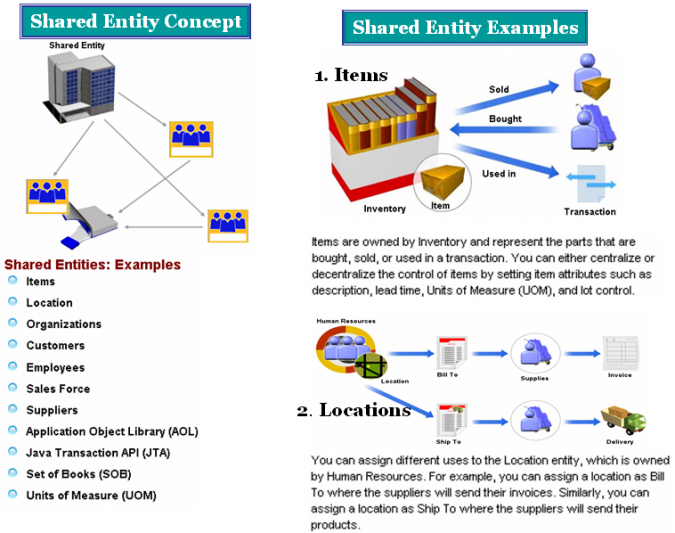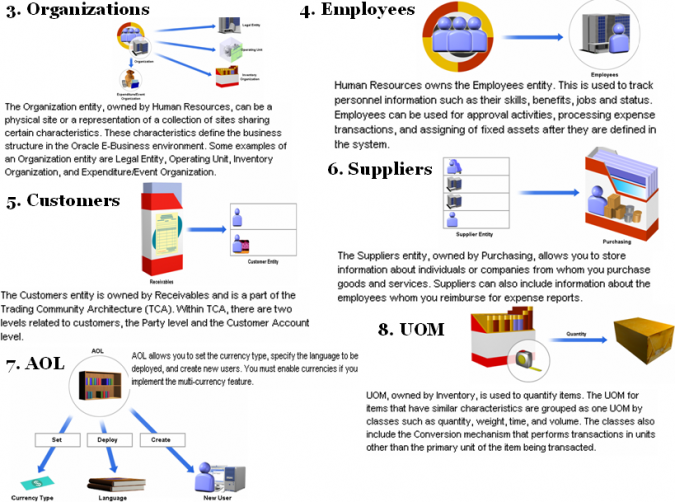from apps. AR_CASH_RECEIPTS_ALL a,
apps. AR_RECEIVABLE_APPLICATIONS_ALL b
WHERE a.ORG_ID=’118′
AND a.CURRENCY_CODE=’USD’
AND a.cash_receipt_id=b.cash_receipt_id
AND b.STATUS=’UNAPP’
GROUP BY a.cash_receipt_id, a.receipt_number, a.Amount
CUSTOMER_TRX_ID
BATCH_SOURCE_ID
TRX_NUMBER
Header-level information about invoices, debit memos, chargebacks, commitments and credit memos.
RA_CUSTOMER_TRX_LINES_ALL
Table Or View: View
CUSTOMER_TRX_ID
CUSTOMER_TRX_LINE_ID
LINE_TYPE : Line, TAX or Freight
LINE_NUMBER
INVENTORY_ITEM_ID
QUANTITY_ORDERED
QUANTITY_CREDITED
QUANTITY_INVOICED
UNIT_STANDARD_PRICE
UNIT_SELLING_PRICE
SALES_ORDER
SALES_ORDER_REVISION
SALES_ORDER_LINE
TAX_EXEMPT_FLAG
SALES_TAX_ID
WAREHOUSE_ID
ORG_ID : Organization identifier
RA_CUSTOMER_TRX_LINES_ALL contians the line level information of invoices (header informations are stored in RA_CUSTOMER_TRX_ALL).
This view contains information for all the type of lines : Line, TAX and Freight.
RA_CUST_TRX_TYPES_ALL
CUST_TRX_TYPE_ID NUMBER : Transaction type identifier
NAME : Transaction type Name
TYPE
POST_TO_GL : Indicates if transactions should be posted to the General Ledger. Y for yes, N otherwise.
ACCOUNTING_AFFECT_FLAG : Indicates if transactions affect open receivable balances. Y for yes, N otherwise.
CREDIT_MEMO_TYPE_ID : Transaction type identifier of subsequent credit memos
ORG_ID NUMBER : Organization identifier

The RA_CUST_TRX_TYPES_ALL table stores information about each transaction type that is used for invoices, commitments, bills receivable, and credit memos. Each row includes AutoAccounting information as well as standard defaults for the invoices that result.
The POST_TO_GL column stores Y or N to indicate if this transaction can post to your General Ledger.
The ACCOUNTING_AFFECT_FLAG column stores Y or N to indicate if this transaction can update your open receivables balances. If the ACCOUNTING_AFFECT_FLAG column is Y, you can see this transaction in your agings.
The TYPE column contains:
INV – Invoice
CM – Credit Memo
DM – Debit Memo
DEP – Deposit
GUAR – Guarantee
If AutoAccounting is based on transaction type, the GL_ID_REV, GL_ID_FREIGHT, and GL_ID_REC columns store the default revenue, freight, and receivables accounts. The STATUS and CREDIT_MEMO_TYPE_ID columns are required even though they are null allowed.
The primary key for this table is CUST_TRX_TYPE_ID.
INVOICE_ID – NUMBER : Unique internal Identifier for this record. Generated using a database sequence.
VENDOR_ID – NUMBER : The unique internal identifier of the supplier to which the invoice belongs. Foreign key to the AP_SUPPLIERS table.
INVOICE_NUM : Invoice number for an invoice. This number entered will be unique per supplier and operating unit.
SET_OF_BOOKS_ID : Ledger unique identifier
INVOICE_CURRENCY_CODE : Currency code of the invoice. Foreign key to the FND_CURRENCIES table.
PAYMENT_CURRENCY_CODE : Currency code of payment. If the Invoice Currency is not a fixed-rate currency, then the Payment Currency will be the same as the INVOICE_CURRENCY_CODE. For fixed-rate currency such as euro or another EMU currency it can be different to INVOICE_CURRENCY_CODE
PAYMENT_CROSS_RATE NUMBER : Yes Exchange rate between invoice and payment. The value is always 1 unless they are associated fixed-rate currencies such as euro or another EMU currency.
DOC_SEQUENCE_ID NUMBER : Unique Sequence identifier assigned to an invoice, based on the document category of the invoice. Foreign key to the DOC_SEQUENCE_ID of the AP_DOC_SEQUENCE_AUDIT table.
DOC_SEQUENCE_VALUE NUMBER : Sequence name assigned to an invoice, based on the document category of the invoice. Foreign key to the DOC_SEQUENCE_VALUE of the AP_DOC_SEQUENCE_AUDIT table
This table corresponds to the Invoices header block of Invoice workbench. AP_INVOICES_ALL holds information of all AP invoices whether it is a manually entered, imported, created from other products like Oracle Loans, Oracle Projects, iSupplier Portal, Refunds from Oracle Receivables etc. This table holds all type of invoices, which includes Standard, Prepayments, Credit Memo, Debit Memo, Mixed invoice, Withholding invoice, Interest Invoice, Retainage invoices, Payment Requests etc., An invoice can also have one or more scheduled payments. There will be one row for each invoice you enter.
An invoice can have one or more invoice lines and each line can have one or more invoice distributions.
An invoice of type EXPENSE REPORT must relate to a row in AP_EXPENSE_REPORT_HEADERS_ALL unless the record has been purged from AP_EXPENSE_REPORT_HEADERS_ALL.
Oracle Payables application uses the INTEREST type invoice for interest that it calculates on invoices that are overdue. Oracle Payables application links the interest invoice to the original invoice by inserting the INVOICE_ID in the AP_INVOICE_RELATIONSHIPS table.
The accounting code combinations stored in this table is meta data for creating accounting entries in Subledger Accounting. Payables provides the code combinations stored in this table to Subledger Accounting as a source for accounting attributes for deriving the accounting code combinations. Subledger Accounting generates the final accounting entries that are posted to General Ledger. The accounting code combination used in the final accounting entries can be same as that stored in AP_INVOICES_ALL table or can be different depending on the rules setup in Subledger Accounting. The XLA_AE_HEADERS and XLA_AE_LINES tables in Subledger Accounting stores the accounting entries posted to General Ledger.
AP_HOLDS_ALL
WF_STATUS : Holds resolution workflow status
AP_HOLDS_ALL contains information about holds that you or your Oracle Payables application place on an invoice. For non-matching holds, there is one row for each hold placed on an invoice. For matching holds, there is one row for each hold placed on an invoice-shipment match. An invoice may have one or more corresponding rows in this table. Your Oracle Payables application does not pay invoices that have one or more unreleased holds recorded in this table.
This table holds information referenced by the Invoice Holds window.
In the strictest sense, AP_HOLDS_ALL has no primary key. It is possible for your Oracle Payables application to place a certain type of hold on an invoice, then release it, then place another hold of the same type (if data changes before each submission of Payables Invoice Validation), which would result in a duplicate primary key. But for practical purposes, the primary key is a concatenation of INVOICE_ID, LINE_LOCATION_ID, and HOLD_LOOKUP_CODE.
AP_INVOICES_INTERFACE
INVOICE_ID : Unique identifier for this invoice within this batch. Same value should be populated in invoice’s lines in the AP_INVOICE_LINES_INTERFACE table to identify the data as belonging to the same invoice.
INVOICE_NUM : Enter the invoice number that needs to be assigned to the invoice created in Payables from this record. The number must be unique for the supplier. If no value is populated in this column, then during import, Payables uses the system date at the time of import as a default.
PO_NUMBER : Purchase order number from PO_HEADERS.SEGMENT1. This column needs to be populated if invoice to be matched with an purchase order.
VENDOR_ID NUMBER : Unique identifier for a supplier. Validated against (PO_VENDORS.VENDOR_ID). Supplier of the invoice to be derived by value in one of the following columns in this table: VENDOR_ID, VENDOR_NUM, VENDOR_NAME, VENDOR_SITE_ID or PO_NUMBER.
This is the open interface table for importing AP Invoices from external sources and stores header information about invoices. Invoice data comes from sources including: EDI invoices from suppliers that are loaded through Oracle e-Commerce Gateway, supplier invoices that are transferred through the Oracle XML Gateway, invoices that are loaded using Oracle SQL*Loader, lease invoices from Oracle Property Manager, Disbursements from Oracle loans, lease payments from Oracle Assets, credit card transaction data that are loaded using the Credit Card Invoice Interface Summary, Expense Report invoices from Oracle Internet Expenses, Payment Requests from Receivables, and invoices that are entered through the Invoice Gateway. There is one row for each invoice you import. Oracle Payables application uses this information to create invoice header information when Payables Open Interface program is submitted.
Data in the AP_INVOICES_INTERFACE table used in conjunction with AP_INVOICE_LINES_INTERFACE table to create Payables Invoice, Invoice lines, Distributions and Schedule payments.
Data in this table can be viewed and edited using ‘Open Interface Invoices’ window.
The Payables Open Interface program validates each record in this interface table selected for import, and if the record contains valid data then the program creates a Payables Invoice.
INVOICE_ID : Invoice identifier.Validated against AP_INVOICES_INTERFACE.INVOICE_ID
INVOICE_LINE_ID : Invoice line identifier
LINE_NUMBER : Invoice line number
LINE_TYPE_LOOKUP_CODE : Type of invoice line (Item, Freight, Tax, Miscellaneous)
LINE_GROUP_NUMBER NUMBER : Value to identify each item line to which you want to prorate
This is the lines interface table for the AP Invoice Open Interface. Use it in conjunction with AP_INVOICE_INTERFACE table.
AP_INVOICE_LINES_INTERFACE stores information used to create one or more invoice distributions. Note that one row in this table may create, during the import process, more than one invoice distribution. For example, if you enter a Tax line in this table and prorate it across multiple Item lines, during Open Interface Import the system may create multiple Tax invoice distributions based on the single Tax line in this table.


| S | M | T | W | T | F | S |
|---|---|---|---|---|---|---|
| 1 | 2 | 3 | 4 | 5 | 6 | 7 |
| 8 | 9 | 10 | 11 | 12 | 13 | 14 |
| 15 | 16 | 17 | 18 | 19 | 20 | 21 |
| 22 | 23 | 24 | 25 | 26 | 27 | 28 |
This site uses cookies and other tracking technologies to assist with navigation and your ability to provide feedback, analyse your use of our services, and provide content from third parties. By continuing to browse the site, you are agreeing to our use of cookies.
Got ItLearn moreWe may request cookies to be set on your device. We use cookies to let us know when you visit our websites, how you interact with us, to enrich your user experience, and to customize your relationship with our website.
Click on the different category headings to find out more. You can also change some of your preferences. Note that blocking some types of cookies may impact your experience on our websites and the services we are able to offer.
These cookies are strictly necessary to provide you with services available through our website and to use some of its features.
Because these cookies are strictly necessary to deliver the website, refusing them will have impact how our site functions. You always can block or delete cookies by changing your browser settings and force blocking all cookies on this website. But this will always prompt you to accept/refuse cookies when revisiting our site.
We fully respect if you want to refuse cookies but to avoid asking you again and again kindly allow us to store a cookie for that. You are free to opt out any time or opt in for other cookies to get a better experience. If you refuse cookies we will remove all set cookies in our domain.
We provide you with a list of stored cookies on your computer in our domain so you can check what we stored. Due to security reasons we are not able to show or modify cookies from other domains. You can check these in your browser security settings.
These cookies collect information that is used either in aggregate form to help us understand how our website is being used or how effective our marketing campaigns are, or to help us customize our website and application for you in order to enhance your experience.
If you do not want that we track your visit to our site you can disable tracking in your browser here:
We also use different external services like Google Webfonts, Google Maps, and external Video providers. Since these providers may collect personal data like your IP address we allow you to block them here. Please be aware that this might heavily reduce the functionality and appearance of our site. Changes will take effect once you reload the page.
Google Webfont Settings:
Google Map Settings:
Google reCaptcha Settings:
Vimeo and Youtube video embeds:
The following cookies are also needed - You can choose if you want to allow them:
You can read about our cookies and privacy settings in detail on our Privacy Policy Page.
Privacy Policy
Recent Comments